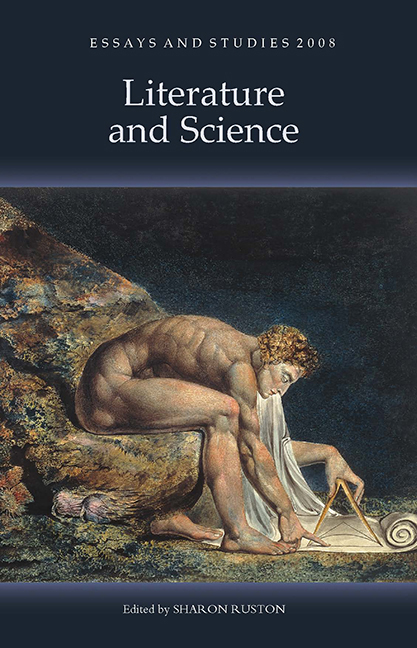Book contents
- Frontmatter
- Contents
- List of Illustrations
- Acknowledgements
- Notes on Contributors
- Introduction
- 1 From Popular Science To Contemplation: The Clouds Of The Cloud Of Unknowing
- 2 ‘Dreams And Plain Dotage’: The Value Of The Birth Of Mankind (1540–1654)
- 3 Natural Rights And Natural History In Anna Barbauld And Mary Wollstonecraft
- 4 George Eliot, Geometry And Gender
- 5 On The Back Of The Light Waves: Novel Possibilities In The ‘Fourth Dimension’
- 6 Le Fanu's ‘Carmilla’, Ireland, And Diseased Vision
- 7 Evolution, Literary History And Science Fiction
- 8 ‘The Luxury Of Storytelling’: Science, Literature And Cultural Contest In Ian Mcewan's Narrative Practice
- Index
Introduction
Published online by Cambridge University Press: 12 February 2019
- Frontmatter
- Contents
- List of Illustrations
- Acknowledgements
- Notes on Contributors
- Introduction
- 1 From Popular Science To Contemplation: The Clouds Of The Cloud Of Unknowing
- 2 ‘Dreams And Plain Dotage’: The Value Of The Birth Of Mankind (1540–1654)
- 3 Natural Rights And Natural History In Anna Barbauld And Mary Wollstonecraft
- 4 George Eliot, Geometry And Gender
- 5 On The Back Of The Light Waves: Novel Possibilities In The ‘Fourth Dimension’
- 6 Le Fanu's ‘Carmilla’, Ireland, And Diseased Vision
- 7 Evolution, Literary History And Science Fiction
- 8 ‘The Luxury Of Storytelling’: Science, Literature And Cultural Contest In Ian Mcewan's Narrative Practice
- Index
Summary
WHEN INTERVIEWED by the Times in August 2007 V. S. Naipaul said that English literature departments in universities should be closed down. Naipaul claimed that universities should only teach science and that they should only ‘deal in measurable truth’ (Appleyard 2007). This is a striking case of a man best known as a novelist denying the validity of the professional literary critic. One might draw a parallel with C. P. Snow's Rede Lecture in 1959, in which he too objected to ‘literary intellectuals’ (Snow 2005, 4). Why is it that literary critics engender such feelings in the authors they study and discuss? And, why is it that the study of literature (as opposed to the study of other humanities subjects) has so often been positioned antagonistically against science?
Certainly Naipaul's work, unlike, say, Ian McEwan's, is not especially interested in exploring scientific matters or methods, or any possible common ground between science and literature. His objection with English literature academics is that by publishing their ideas they ‘distort’ our view of things. The ideas they present are not popular or widely held: ‘They're just ideas in grubby little textbooks that are stuffed in students’ bags.’ Closing down English departments across the world would have an immediate impact: ‘It would release a lot of manpower. They could go and work on the buses and things like that’ (Appleyard 2007). These few lines reveal some often-heard criticisms of the English academic: they have an unrealistic sense of their own importance; their profession is enclosed, self-sustaining and separate from the outside world; they could be doing something more useful. To a literary critic, though, the wording of that phrase, the ‘grubby little textbooks’ that we write for students, is fascinating and suggestive. It smacks of a kind of Leavisite-elitism that was clearly revealed in that critic's vitriolic response to Snow, accusing him of a ‘vulgarity of style’, his novels of evincing ‘nonentity’ on every page (quoted in Snow 2005, xxxiv).
How much has changed since C. P. Snow's lecture, which gave us the phrase ‘two cultures’ to describe the ‘gulf of mutual incomprehension’ that existed between ‘literary intellectuals’ who did not know the Second Law of Thermodynamics, and scientists, who, with ‘the future in their bones’, found Dickens ‘the type-specimen of literary incomprehensibility’ (Snow 2005, 4, 15, 10, 12)?
- Type
- Chapter
- Information
- Literature and Science , pp. 1 - 12Publisher: Boydell & BrewerPrint publication year: 2008
- 1
- Cited by



